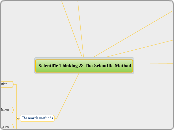Scientific Thinking & The Scientific Method
Critical thinking
Applying the scientific method in everyday life
A Method of aquring reliable knowlege about Nature
Empiricism
Evidence that is succeptible to one's senses and can be experienced by other people
Only evidence to be used to sound vital conclusions by scientists and critical thinkers
Prefered kind of evidence to all other kinds
Rationalism
Logical reasoning by scientists and critical thinkers
To deny one's emotions and face reality
Skepticism
Constant questioning of one's beliefs and conclusions
Research methods
Experimentation
The researcher changes a variable to see if the other variable will change
The variable manipulated is called independent variable
The variable that cannotbe manipulated is called dependent variable
All tests are carried under controlled conditions
Correlation
Correlation is classified as a nonexperimental, descriptive method
mathematical technique for summarizing data
Survey
The survey, another type of non experimental, descriptive study
interviews or questionnaires
Case study
This method is also a nonexperimental, descriptive type of study
It involves an in-depth descriptive record kept by an outside observer
Naturalistic observation
the researcher very carefully observes and records some behavior or phenomenon
It is carried over a prolonged period in natural setting
